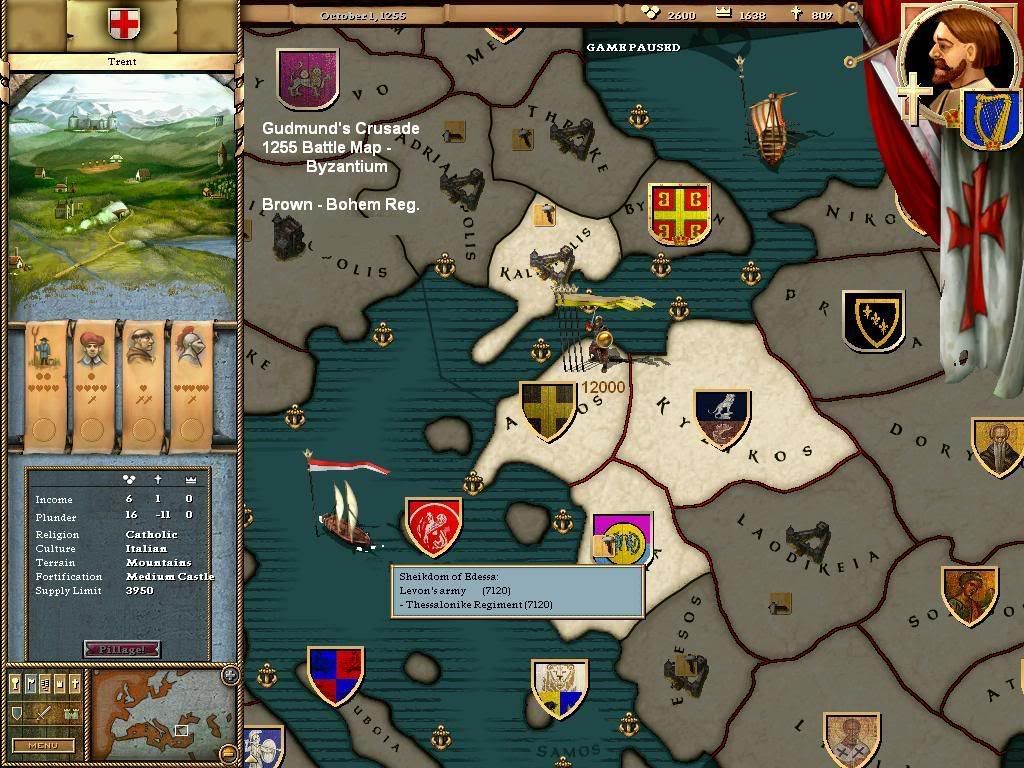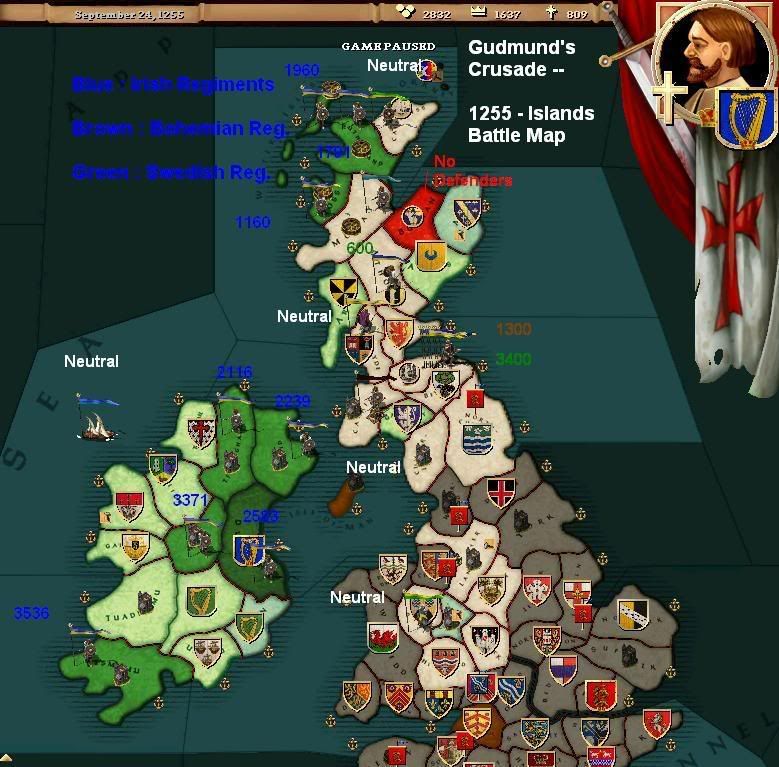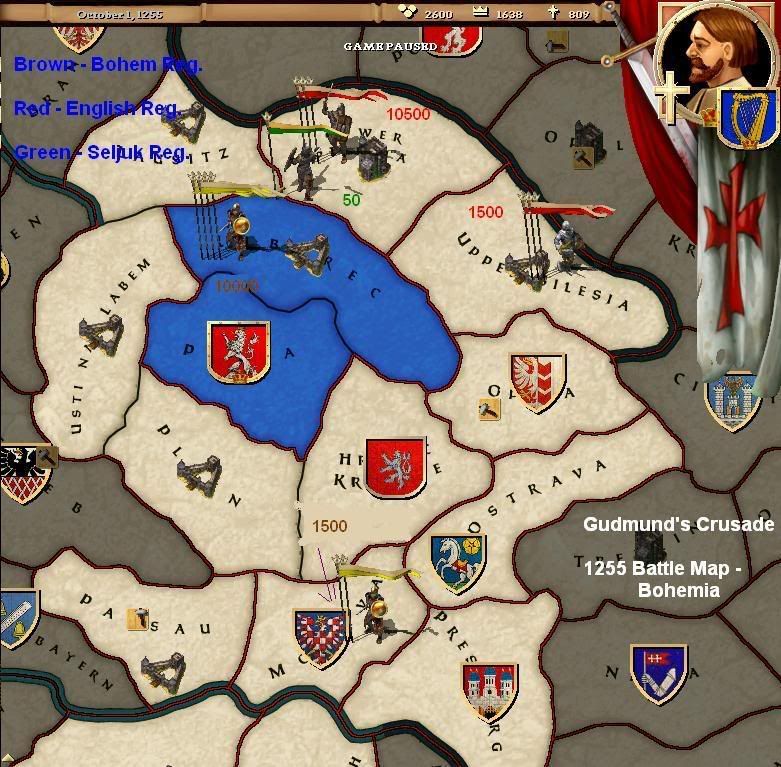Gudmund's Crusade: The Retaking of Scotland
The Bohemian Envoy was received within the Halls of Ireland's King, Gudmund the First, where news was heard of Bohemia's struggle with the Fatimid menace. The thoughts of Gudmund's advisors had already turned to the possibility of a limited war to conquer the Muslims of Scotland and reclaim the title of King over that land. But the Bohemians were facing a seemingly unquenchable threat from the Muslims as army after army invaded the country. Thus far Bohemia had held off the invaders, with a forward army of 12000 keeping watch near Byzantium. Another army nearly that strong defended the homeland, while a western force dealt with invaders from Muslim France.

Beyond Bohemia's concerns, the Crusade had already begun as Sweden, the Teutonic Order, Burgundy and of course Bohemia were now at war with the Fatimids. Meanwhile, England fought the Seljuks, aided only by the outsiders of the Il-Khanate. Gudmund could aid the others in their crusade, or abandon them to defeat. It was no choice at all to the King of Ireland, who immediately sent for his generals, with orders to wake up all the knights of his demense, and in time all the armies of the lands of Ireland.
For Bohemia's part, they planned to send their Western army to the shores of Scotland and aid in the retaking of the land. Unbeknowst to the others, Sweden had already set sail for Scotland as well. And in a twist of irony, the armies of Buchan had already been called away by the Fatimids. Declaring war on Buchan and Ravenna, Gudmund held off on raising the armies of his vassals. He knew that the invasion of Scotland would be the easy part, while the campaign in France and points eastward would require fresh troops.
The Crusade began with all the armies of three nations arrayed against only the young and the very old who were left there to defend the keep at Buchan.
Buchan fell in just a month and a half, on December 3rd, 1255. In Bohemia, the situation was just as lopsided. England routed a small Seljuk army while Bohemian armies looked on from the South. They were waiting, reservists charged with defending the land from any invading Fatimid armies. As of yet, they had spilled no blood.
While the regiments of Sutherland and the Western Isles moved on Buchan, Gudmund lead the bulk of his forces to Ravenna. The sea voyage would take some time, but the victorious armies at Buchan wasted no time in continuing the crusade. Atholl was next for them, and the price of Atholl was the involvement of Medina in the war. Unlike the Fatimids, who had largely been swept from the field in the west, the Medinans had many regiments there.
Gudmund had authorized the hiring of Mercenaries as needed and as funds were available. Like the times of old, the Crovans would rely on them, in this case recruiting Occitans. Atholl defended its land with both keep and regiment, but Irish armies overran them and begin the siege. Gudmund's armies had all the momentum at the moment, but that meant little if they could not hold out against the numbers of the Fatimid Empire. With their armies split into French and Scottish Expeditionary forces, it was time to enlist the support of Ireland's vassals. Meanwhile, Bohemian forces in Scotland declared war on Lothian, and Ireland immediately joined the battle for that county.
Gudmund landed at Vexin, where he met Fatimid regiments in battle on its shores. While the fighting was fierce, Gudmund was able to defeat the defenders and march on Eu. At Eu, however, the empire showed its might, beating back the advancing crusaders. Retreating back to Vexin, Gudmund's regiments spotted additional Fatimid armies at sea, but they did not land there, continuing to sail towards Scotland instead. Rested, Gudmund led his armies east again, while the Empire's defenders had been slipping away onto ships and to sea. Unopposed, Gudmund headed southeast. Spotting large armies in Southern France, Gudmund cut his losses, reaching a peace agreement with Ravenna. Then he headed to battle with the enemy, as he was determined to prevent more Fatimid regiments from setting sail for Scotland. In the Battle of Lyon, Gudmund narrowly lost to the Fatimids, and retreated once more with a much reduced force. But in Scotland the Fatimids were still far off, and local armies were no match for them as Atholl and Lothian were conquered for Gudmund.




